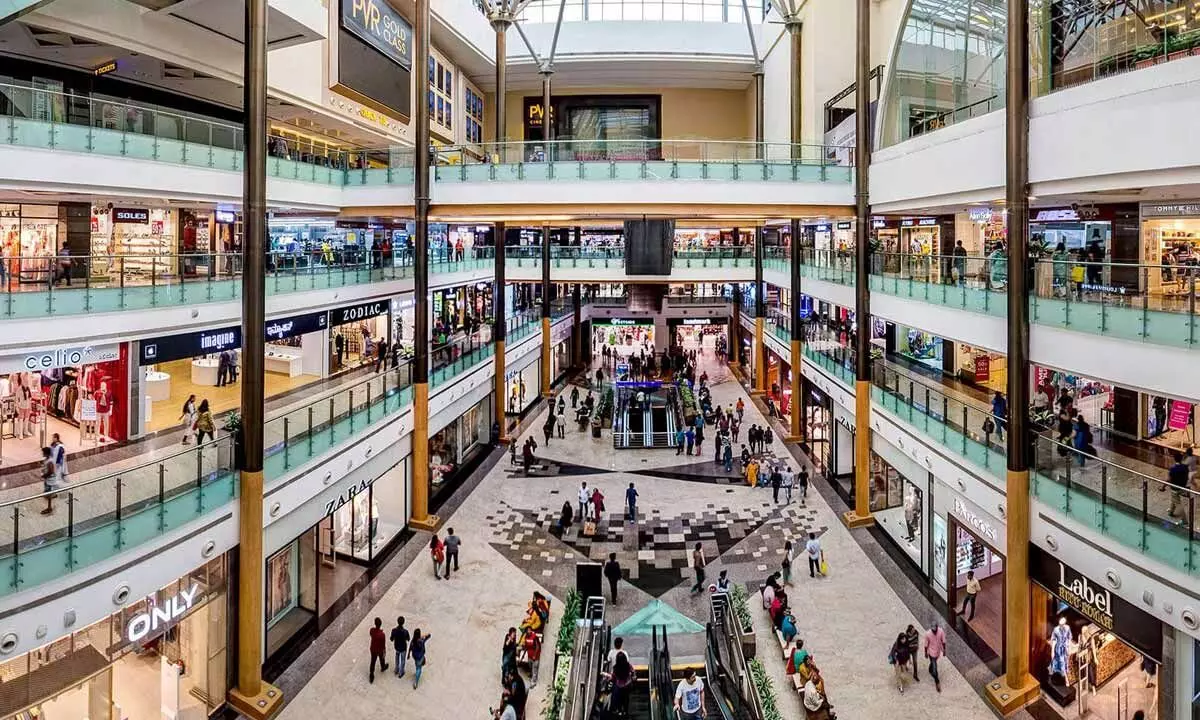Covid-induced e-shopping results in ghost malls

Covid-induced e-shopping results in ghost malls
There are more than 40 shopping malls in Bengaluru itself and currently, more than 1,000 shops are empty with no traders in them.
Bengaluru: The people of Bengaluru who have turned towards e-shopping after the Covid epidemic, seem to be coming out of the mall culture. Therefore, the business in the malls have reduced and the stores are empty. Also, the use of OTT platforms is increasing and the number of people going to multiplexes in malls is also decreasing. The city dwellers can get all the essentials from groceries to food at their doorsteps. Thus, Bengalureans reportedly have reduced their interest in visiting malls to shop.
The people who used to spend time in shopping malls when they get holidays have disappeared. People who used to make malls their favourite destination for everything like clothes, footwear, watching movies, are now freeing themselves from the mall culture. That is why stores are empty in major shopping malls and 15.6 per cent of stores are empty in urban shopping malls. People used to come to shopping malls with the intention of spending some time with their loved ones along with buying all things in one place.
But in 2020, due to the anxiety created by Corona infection, lockdown and other measures, people have reached a state of not leaving their homes. Especially due to the two waves of Covid that appeared in 2020 and 2021, people left Bengaluru and went to their respective towns. Thus, even after the severity of Corona infection has reduced, the shopping malls of the city have been hit to a large extent. Apart from that, the e-commerce sector which is growing day by day, and the creation of innovative platforms like OTT, the stores in the shopping malls of Bengaluru are becoming empty.
Currently, 271 shopping malls are functioning in the country. There are more than 40 shopping malls in Bengaluru itself. It has more than 15 stores spread over 36 million square feet. Other than that there are more than 20 stores with an area f 29.1 million sq.ft and around 5 stores with an area of 27.8 sq.ft. Over 15.6 percent of the shops in these shopping malls are vacant. That means more than 1,000 shops are empty and there are no traders.
Creation of ghost malls
Traders are averse and people are apathetic towards shopping malls, resulting in a rise in the creation of ghost malls (empty malls) in the city over the past two years. Among the vacant stores in the country, 15.6 per cent of the stores are vacant in Bengaluru shopping malls. After June 2021, the number of people coming to shopping malls has not increased even after the cases of Covid has reduced. Due to this, malls are struggling without seeing any increase in store occupancy.
Bengaluru has more than 50 multiplex theatres in shopping malls. Since the opening of these multiplexes, single screen theatres in the city have taken a huge hit. Many theatres have already closed. Meanwhile, OTT platforms have taken over business of multiplexes in shopping malls. Movies released in multiplexes are released on OTT apps within a maximum of one month. Due to this the number of people coming to multiplexes is also reduced. This led to the closure of many multiplexes. According to a report, 87 lakh people in Bengaluru are users of Amazon, Hotstar, Netflix and other OTT apps. Lockdown was announced in March 2020 after the severity of Covid infection increased in the country. Due to this, all business transactions came to a standstill. In addition, people started leaving Bengaluru due to the fear of Corona and the difficulty of living. In Bengaluru, which had a population of 1.20 crore, during the first lockdown due to Corona, more than 20 lakh people left the city and went to their hometowns. Similarly, during the 2nd lockdown period, more than 10 lakh people left the city. This hit all kinds of business including shopping malls in the city.
Covid: A blow to business
In 2020 and 2021, many industries in Bengaluru have suffered a loss of more than Rs 1 lakh crore due to the Corona infection and lockdown and other measures. In particular, there was a business loss of more than 50,000 crore rupees for wholesale business including shopping malls. In both the years, the shopkeepers withdrew their deposits and vacated the shops as the shopping malls did not function for more than 6 months. In 2020 and 2021 itself, more than 70 percent of the shopkeepers had withdrawn from the business.
Another major reason why people are not turning towards wholesale businesses including shopping malls is the growing interest of consumers towards online shopping (e-commerce). Everything from clothes, footwear to electronics, vegetables and fruits to ready-made food can be fetched sitting at home. Thus, even though people have consecutive holidays, they get everything while sitting at home without leaving home. Apart from that, additional discounts are being given on the items on other important days including festivals.
Also, smartphone and internet usage has increased over the last five to six years. More than 95 percent of people have smart phones and can get internet service at low cost. This makes using the online shopping app easy. The online shopping transaction, which was 52 billion dollars in 2020, has increased to 68 billion dollars by 2021. If you look at it, it has increased by 30% in one year. People shop online more after the second wave than the first wave of Corona. There has been a huge increase in the number covid cases. Due to this, the warehousing and logistics industry in the city has become profitable. Millions of people left Bengaluru and migrated to Tier II and III cities when the severity of Corona infection increased. Only 50 per cent of them have returned to the city. Thus, the number of people in tier 2 and tier 3 cities has increased and the number of shopping malls has increased in those cities. The Chairman, Credai, Bhaskar T Nagendrappa said, "Due to Corona, most of the business in Bengaluru was hit. Especially shopping malls have also suffered losses. This is a short-term effect and the market will soon recover from it. People are also coming to shopping malls."








